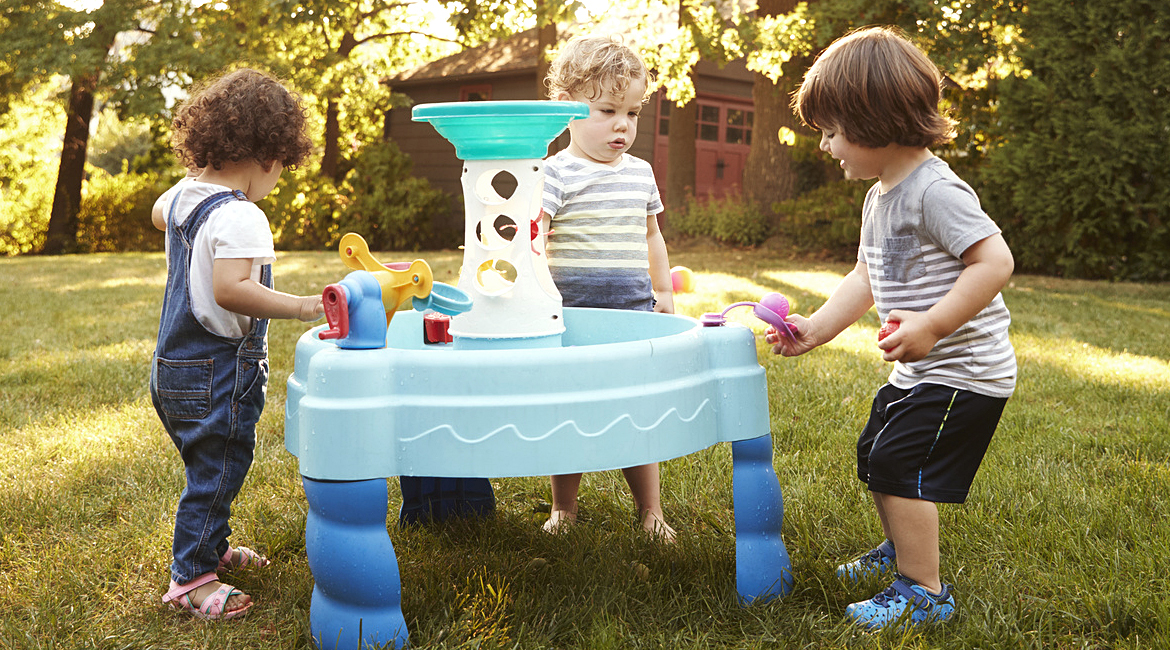Forming friendships is an important milestone for your child to reach. The entire process of learning how to make friends and how to interact with others can be an ever-changing and evolving experience. Though children start forming friendships during their early years, it may take until adulthood for the process to be complete. As a parent, it’s your job to help, teach and guide your child as he learns how to navigate his friendships throughout his life. Staying positive and giving him the tools to understand what makes a good friend can set your child on the road to healthy relationships throughout his life. Let’s take a closer look at ways you can help your child learn to make friends.
Early Birds
When your child is a baby or entering toddlerhood, they may notice other little ones and mimic their behaviors. At this stage in their development, however, playtime will be mostly parallel meaning they’ll play side by side but not necessarily together.[1] As your little one grows into a preschooler, they’ll begin to develop the skills necessary to play with others and make friends. The early years may be marked with times of learning to share and disagreements about which activity to play at which time. Once your child begins to enter Kindergarten, friendships will become very important. Your child may come home from school talking about a specific few friends that they love to play with throughout the day. During this time, it’s imperative to spend one-on-one time talking about the importance of cooperation and respect for others decision making.
Find A Tribe
According to the National Institutes of Health and an article published by the National Academies Press entitled, “From Neurons to Neighborhoods: The Science of Early Childhood Development,” modern children now spend more time interacting with children that aren’t in their family, meaning the importance of making friendships looks different than it did 50 years ago. One of the best ways you can let your child practice their friendship skills in a quiet environment is to schedule a playdate. This is usually best done with other children in the neighborhood or by contacting other moms of kids in his class at school. This is especially important for those kids that are shy or just find it hard to make friends.[2] If your child is on the autism spectrum, it’s also very important that they get time to learn about social play and friendships while interacting with others in a fun and safe environment. Though your little tribe may not stay together forever (It’s normal for friendships to fall apart as children grow and mature!), it’s still a vital and important step to building those first crucial friendships.
Be A Friend, Get A Friend
Another way you can help foster friendship building in your child is to teach them about the qualities that are found in a good friend. Make a list of great characteristics to look for in a friend, like someone who is fun to play with, likes to share and is a good listener.[3] Then, talk about ways your child can be a good friend to others. You’ll be excited to hear the ideas they share about being a good friend and you’ll be so proud when you see them actually put those ideas to use. Remember the key is to praise the healthy, good friend behaviors when you see them. It’s always more beneficial for children when you focus on the positive instead of the negative.
The Bullying Issue
On the flip side, you’ll want to teach about and look out for bullying behavior either by your child or a child in his friend group. Just as you made a list of good qualities, it’s important to also talk about what makes for an unhealthy friendship. Teach your child that they should tell an adult if they see or experience bullying behavior. If you see a tendency for your child to be a bully, talk with them about their behavior and how it makes others feel and have them make amends for bullying behavior. Remember, the key with this is to disagree with the bullying behavior but never put down or belittle your own little one in the process. If bullying continues to be an issue, talk to your child’s teacher or guidance counselor, both of which are trained to handle the bullying situation and give your child healthy steps to take to get to a new, improved attitude.
Be A Model
As a parent, the best thing you can do to teach your child about cultivating healthy relationships is to model that behavior yourself. Show your child moments of cooperation and benevolence. Talk through issues with your spouse in a calm, productive way. Show your child moments of sharing, laughing and having fun with others so that they can build their own relationships in healthy and positive ways.
Know Your Child
Each and every child is beautiful and unique. Some children are innately going to be outgoing and able to make a million different friends. Others may be shy and have only a few close friendships. Raising your child to be true to who they are, to be a good friend to others and to understand and empathize with their friends is the true end goal. If your child is happy at school and playgroups, you’ve done your job at helping them make friends.
Sources:
[1] Public Broadcasting Station, “Helping Your Child Make New Friends.” link
[2] Scholastic, “Making Friends in Kindergarten.” link
[3] Shonkoff JP, Phillips DA, editors. National Academies Press, “From Neurons to Neighborhoods: The Science of Early Childhood Development.” 2000. link
About the Author:
Tracy E. Brown is a journalist and educator with over 14 years of experience working in the field of Child Development. She is currently the Assistant Editor of Black Dress/Red Wagon Magazine in Atlanta, Ga. and previous Associate Editor at Pregnancy & Newborn Magazine. She previously taught preschool at the Goddard School in Farragut, Tennessee and taught Kindergarten for Dekalb County Schools in Atlanta. Other writing credits include the Green Building Research Institute, London’s facetheory.com, WBIR Channel 10 News, PBS, Duke University and American Airlines. She is also a mom to three adorable little ones.



